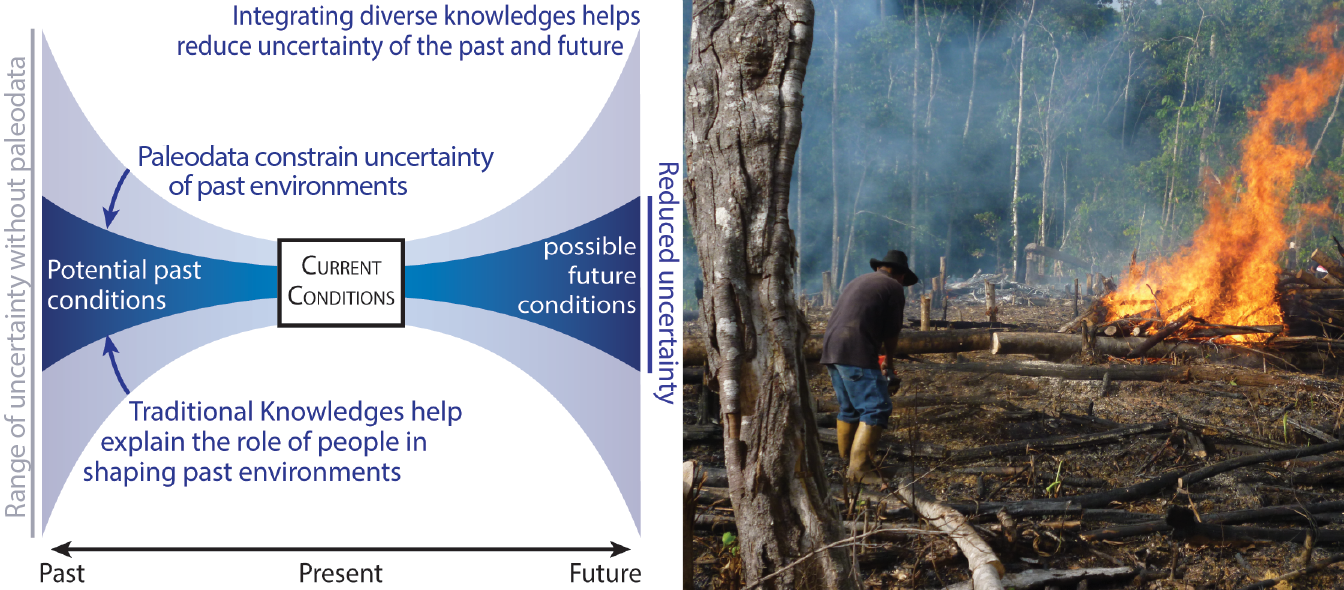- Home
- Publications
- PAGES Magazine
- Editorial: Socio-ecological Approaches To Conservation
Editorial: Socio-ecological approaches to conservation
Colombaroli D and Larson E
Past Global Changes Magazine
30(1)
33
2022
The recent UN Climate Change Conference in Glasgow (COP26) highlighted key priorities for supporting climate mitigation goals and strengthening policies on adaptation to future climate changes (UNFCCC 2021). In particular, the Glasgow Leaders' Declaration on Forests and Land Use pledged the conservation and sustainable management of forests, with the primary goal to end deforestation by 2030 (Glasgow Leaders' Declaration 2021).
Such ambitious initiatives highlight the urgent need for more sustainable land-use practices to avoid disastrous ecological losses. Challenges emerge, however, from conflicts between conservation targets and socio-ecological and environmental needs (Colombaroli et al. 2019). For example, traditional land stewardship among many Indigenous cultures includes the intentional use of fire to enhance biodiversity and reduce fire risk (Lake and Christianson 2019). Yet, these practices have been curtailed over decades by fire exclusion, monoculture afforestation and other practices, often justified by a pervasive "myth" of wilderness held in many western societies (Mariani et al. p. 34). Conservation plans shaped by this myth often lack the knowledge base to reconcile set restoration targets and traditional use by local communities (Berkes 2004). Through ongoing processes of colonization, this often results in the exclusion or eradication of Indigenous cultures locally, with traditional practices rarely considered for landscape conservation (Johnson et al. p. 36).
Addressing future conservation challenges will require more holistic approaches that weave together the best scientific understanding and the wisdom of Indigenous knowledges (Mistry and Berardi 2016). In this issue, we present regional case studies showing how complex conservation challenges can be addressed through the integration of western scientific methods that inform on landscape transformations over time (paleoecology, dendroecology, and archeology), and diverse knowledge systems (Indigenous and Traditional Knowledges; Fig. 1). Merging such diverse approaches may help western thinking to better recognize the role of humans as vital parts of ecological systems, and move toward approaches to management based on reciprocal understanding, rather than the false divide between humans and nature (Caillon et al. 2017).
For example, sediment proxy records in the Mediterranean show how pastoral fires maintained a cultural landscape mosaic of high biodiversity values and lower fire risk over centuries (Coughlan et al. p. 38). In North America, fire-scarred trees serve as biocultural artefacts that provide evidence of the long-lived legacy of human connections to place, and the associated influence of fire that lingers on present landscapes (Johnson et al. p. 36). In South Africa, sediment records illustrate how local communities were highly dynamic and responsive to environmental variability, and how their responses reflected local conditions and resources (Razanatsoa and Gillson p. 40). Archeological and paleorecords in Ireland highlight the long-term spans of people-landscape interactions that shaped ecosystems in a national park (Hawthorne et al. p. 42). Such integrated knowledge reinforces the notion that people have been an integral component of landscapes for millennia, stewarding landscapes over generations, and shaping (and being shaped by) environmental variability. These cultural practices and local adaptations offer models for the maintenance and restoration of resilient landscapes (Kulkarni and Bhaskar p. 44), a crucial step in light of future climate change impacts on ecosystems (Lestienne et al. p. 46).
A recognized challenge exists for identifying best practices for researchers to engage with Indigenous communities and Traditional Knowledges, without furthering the extractive and exploitative relationships perpetrated by western societies for centuries (Copes-Gerbitz et al. p. 48). Conservation priorities set by agencies often fail to acknowledge the significance of local traditions, which often reside outside of conventional Western academic disciplines (le Grange 2004). Efforts to reshape these relationships are growing, such as the GBP 1.7 billion pledge at COP26 to support Indigenous peoples and local communities for more sustainable and effective management. A framework for these efforts is presently lacking (de Freitas et al. p. 50), but clearly this is an area of need.
New integrative, cross-disciplinary evidence is urgently needed to support a more holistic understanding of such complex issues built through dialog between ecological and socio-cultural disciplines, traditionally separated in academia. The science highlights included in this PAGES Magazine issue provide examples of how integrative socio-ecological approaches can help close the gap between disparate disciplines, while helping to bridge understanding between western scientists and Indigenous peoples. This is a primary goal of the PAGES DiverseK working group (pastglobalchanges.org/diversek), which aims to better address conservation challenges that are continuously "moving targets" in the context of ongoing rapid climate and ecosystem changes.
affiliationS
1Department of Geography, Royal Holloway University of London, UK
2Environmental Sciences and Society, University of Wisconsin Platteville, USA
contact
Daniele Colombaroli: Daniele.Colombaroli rhul.ac.uk
rhul.ac.uk
references
Berkes F (2004) Conserv Biol 18: 621-630
Caillon S et al. (2017) Ecol Soc 22: 27
Colombaroli D et al. (2019) Policy Brief. Royal Holloway University of London, 8 pp
le Grange L (2004) S Afr J High Educ 18: 82-91

